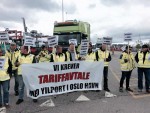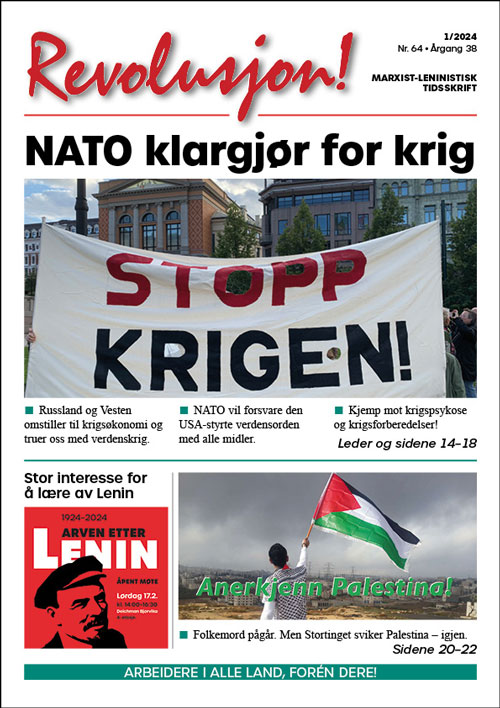The Turkish port operator Yilport Holding is challenging workers’ rights in several countries.
 Rally for the dockers in the port of Oslo on 22nd June 2015. © CC-BY-NC JRSFor more than a year and a half, dockers in Norway have been struggling in a number of ports for their union rights, for their jobs and to establish or defend collective bargaining agreements (CBA). In the port of Oslo, their opponent is not only the Norwegian Employers’ Association (NHO), but even more so the Turkish operating Company, YILPORT, part of the Yildirim Group.
Rally for the dockers in the port of Oslo on 22nd June 2015. © CC-BY-NC JRSFor more than a year and a half, dockers in Norway have been struggling in a number of ports for their union rights, for their jobs and to establish or defend collective bargaining agreements (CBA). In the port of Oslo, their opponent is not only the Norwegian Employers’ Association (NHO), but even more so the Turkish operating Company, YILPORT, part of the Yildirim Group.
This company entirely refuses to negotiate with the Dockers’ Union, and chooses to respond with silence while at the same time hiring cheap and temporary labour for work in the docks.
Background
The conflict in the Norwegian ports started at the Risavika terminal in the city of Stavanger (on the west coast of the country), in November 2013. Here the dockers were denied a CBA on the pretext that it was a private quay terminal and that the ordinary CBA with the Transport Workers’ Union (NTF) did not apply. In response to this provocation, the dockworkers started a boycott on November 1st 2013, with support from their Union, the Norwegian Transport Workers’ Federation (NTF). They have also been backed by the Federation of Nordic and European Transport Workers (ETF).
Escalation of the conflict
Since then the conflict has spread to other ports. In the northern cities Tromsø and Mosjøen, the dockworkers went on strike in support of their comrades in Stavanger. In February 2015 the conflict was extended to Oslo. Here, as in Mosjøen, the dockers were literally locked out from their jobs.
 Blocade of Yilport at the terminal.
Blocade of Yilport at the terminal.
Photo: S. KjosbakkenAll along, this aggressiveness on the part of the employers has been accompanied by a media campaign directed by the employers’ association NHO and aided by reactionary as well as ”liberal” politicians. The dockworkers have been accused of being lazy, unable to respond to ”flexibility” and other fictitious claims. Last year a secret strategy document, devised by the Municipal Port Authorities and the NHO in 2012, was revealed. One of the strategies this document recommended, was that the dockers should be ”obstructed in order to make them alter their attitude”. Another was how to ensure that a new operator could avoid ”inheriting” obligations stated in the existing CBA, when outsourcing parts of the terminal to another operator (i.e. Yilport).
Police arrests protesters in legal labour conflict
In Norway, there is a legal right for unions to go on strike when demanding a CBA. The same right applies to sympathy strikes in solidarity with workers in a CBA conflict. Nevertheless, in Tromsø as well as in Oslo, the police has intervened and arrested tenfold of picketers in the port area. Among the arrested were also local union top officials who support their colleagues in NTF. Here we must add that in Norway, use of police force in labour conflicts has not occurred since the late 1970s.
In spite of this, the reformist top leadership of the Norwegian Confederation of trade unions (LO) has not even protested this police move against its own membership, albeit the LO claims they ”support” the demands of the dockers. A vast number of trade unions within the LO Confederation have demanded that the LO leadership initiates broad solidarity strikes in favour of the dockers. But the LO leadership is in every way avoiding to abide by this request.
The labour court ruling
Last year, in October 2014, the Labour Court heard a case relating to an exemption from the dockers' national CBA. The exemption says that the dockers' right to have priority of engagement to work on the docks did not apply to "company facilities where the company's own people" (industrial/production companies) carry out loading and unloading. The Labour Court's premise for this said that the exception applies where the company has exclusive disposal of the quay area/terminal.
Although all the port conflicts have to do with the organized dockers’ demand for CBAs and warranting their prerogative of unloading and loading ships (as defined in the ILO 137 Convention), they have different local characteristics. This is especially true in the port of Oslo, where the Turkish operator Yilport conveniently has been granted an “exclusive right” to operate on facilities that belong to the municipality of Oslo.
Using Yilport to crush the dockers
 Blocade of Yilport at Sjursøya 26 May 2015.
Blocade of Yilport at Sjursøya 26 May 2015.
Photo: © Vegard Holm.Around the time of the Labour Court decision, it became known that landowner and Port Authority (Oslo Havn KF) has awarded the Turkish company Yilport Holding nothing less than a twenty-year operating concession for running the Sjursøya container terminal in Oslo. The agreement even includes an option for a ten-year extension.
Yilport Holding became Yilport Oslo Terminal Investments AS (YO) and began operating as of 1st February this year. Long before this, in November last year, the dockers had already sent their first request to YO to discuss the future of the collective agreement at the terminal. YO never answered. They didn't respond to reminders and further requests either. They didn't even bother to collect the registered letters from the post office! NTF invited them to voluntary mediation through the State Mediator's office. They didn't even want to meet to discuss this.
Aspiring to expand by cutting labour costs
The attitude of Yilport is a main obstacle in resolving the conflict in the Port of Oslo. Of course they are pursuing their own interests, but they are also being utilized by NHO in order to ram the dockers in particular and the trade union movement in general.
Yilport is eagerly looking for operator contracts in several European ports, especially in Nordic countries, reputedly Portugal as well. “Yilport aims to be in the top 10 port operators by 2025”, according to Eryn Dinyovszky, general manager in the Port of Oslo (The Loadstar, 24th June 2015). Ms Dinyovszky reveals that what she describes as ”the labour situation” and high labour costs have been ”the toughest issue to tackle”.
Workers must confront this company wherever they are present, in order to force them to disband their anti-union practice. The active internationalist support from the Turkish dockworkers and other Turkish unions is of special importance in order to help the Norwegian dockers in the universally important class struggle they are waging.
{jcomments on}

